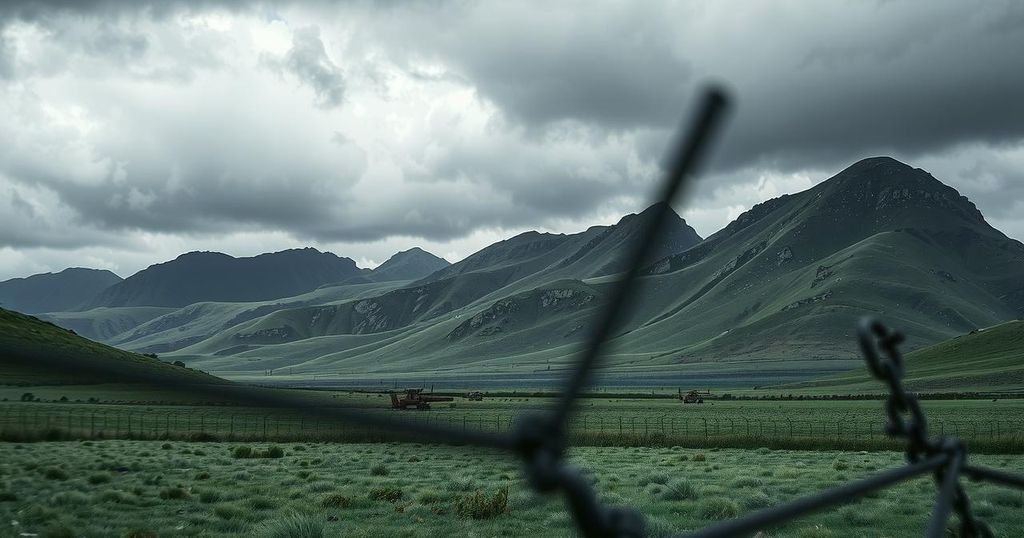The Syrian Army has launched a military offensive to expel Hezbollah from border areas with Lebanon, marking a critical shift in Syrian-Iranian relations. Heavy clashes have occurred with casualties on both sides, as Syria and Lebanon coordinate security efforts against Hezbollah’s operations. This escalation indicates Syria’s determination to reclaim control over its national borders and reduce Tehran’s influence, which may have broader implications for Hezbollah and Iranian regional ambitions.
The Syrian Army has initiated a comprehensive military offensive aimed at expelling Iranian-backed Hezbollah fighters from crucial border regions adjacent to Lebanon. This operation signifies a notable intensification of discord between Syria and Iran’s affiliates. Reports from sources such as Al Arabiya and Sky News Arabia indicate that these confrontations have resulted in casualties for both factions and heightened collaboration between Syrian and Lebanese security forces in combating Hezbollah’s influence.
Intense clashes have erupted in the town of Hosh Al-Sayyid Ali, a border town under Hezbollah control since 2013. Al Arabiya notes a sustained campaign of artillery and missile strikes unleashed by Syrian forces targeting Hezbollah positions. A spokesperson from Syria’s defense ministry affirmed that the objective is to “completely retake the town” and secure the border against Hezbollah’s operations, which include illicit arms trading and smuggling activities.
According to Sky News Arabia, the Syrian Army has been coordinating closely with Lebanese military forces to reinforce border security. The Lebanese Army has reacted to Hezbollah’s provocations, illustrating increasing tensions even among Lebanon’s traditional allies. A military representative stated, “Our forces have been ordered to respond to any attacks from Syrian territory.”
Recent engagements show Hezbollah attempting to counteract the Syrian Army by launching rocket attacks on their positions near Homs. This aggression was met with a reinforced assault from Syrian forces, leading to considerable setbacks for Hezbollah. Reports highlighted significant losses, with at least 12 Hezbollah fighters and 8 Syrian soldiers reportedly killed.
The current confrontations portray a crucial shift in Syria’s approach towards Iranian influence. Hezbollah, historically recognized as Iran’s main militant ally, has played an essential role in extending Tehran’s influence in Syria. However, the recent administration under President Ahmed al-Sharaa appears to be actively confronting this relationship by asserting national sovereignty and curbing Hezbollah’s illicit activities.
This evolving scenario presents a direct challenge to Iran’s strategic aspirations in the region. The prospective loss of Hezbollah’s strongholds in Syria could severely limit Tehran’s efforts to sustain its so-called ‘Axis of Resistance’ against Western and Arab adversaries. Additionally, military difficulties for Hezbollah might embolden dissent within Lebanon, undermining Iran’s influence therein.
The developing situation underscores the increasing rifts within the Iran-led coalition as Damascus places its national priorities above Tehran’s expansionist objectives. As Syrian and Lebanese forces exert military pressure on Hezbollah, the latter risks growing estrangement, indicating a potential decline in Tehran’s unchecked authority in Syria.
The recent military action by the Syrian Army against Hezbollah represents a significant shift in the dynamics of influence in the region. With Syrian forces reclaiming territorial control and reducing Hezbollah’s operations, this may lead to a decrease in Iranian influence within Lebanon and enhance Syrian national sovereignty. This development not only destabilizes Iran’s strategic foothold but may also inspire increased opposition against Hezbollah in Lebanon, further complicating Tehran’s regional ambitions.
Original Source: www.ncr-iran.org






